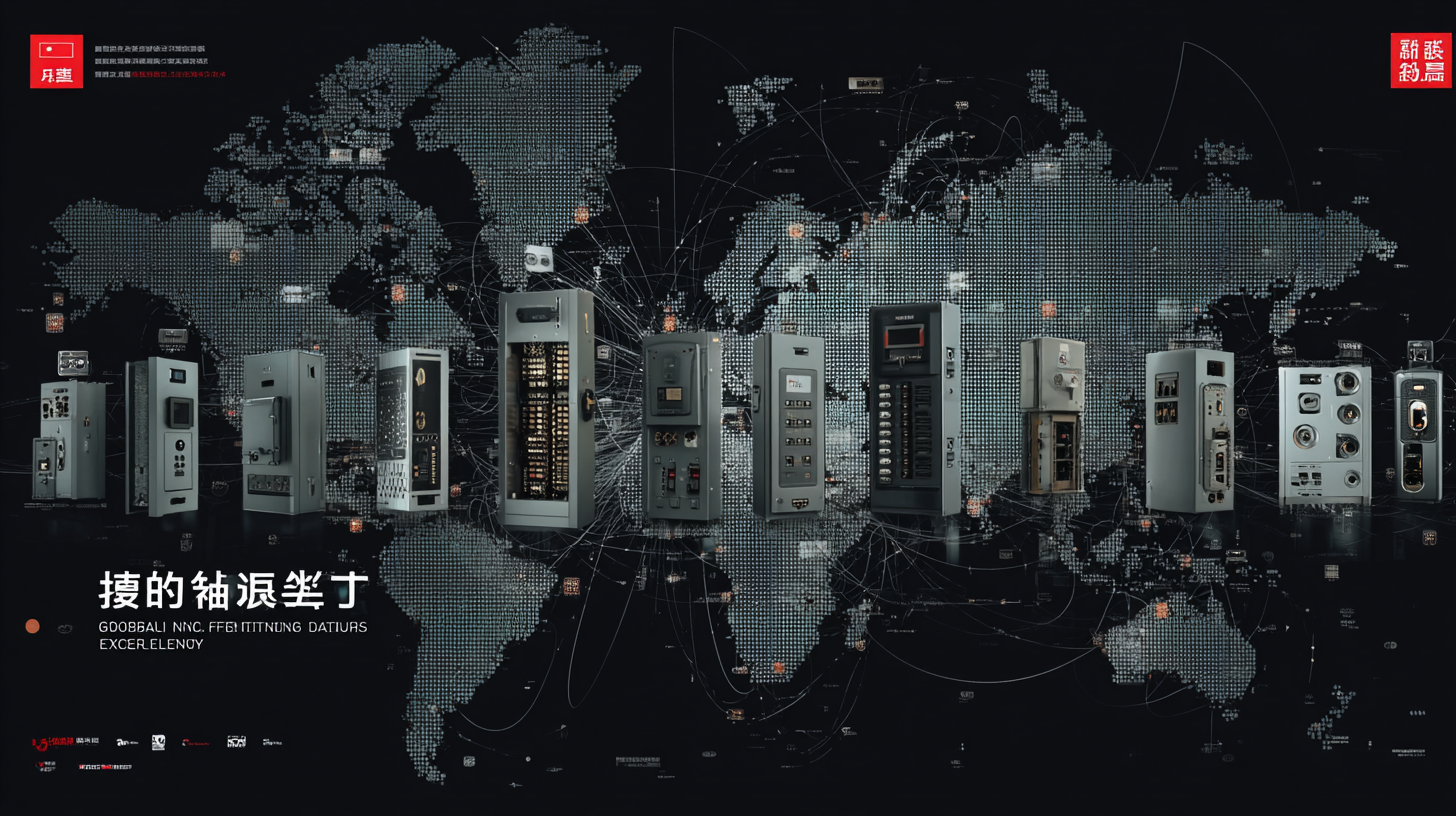Global Reach of China's Leading Security Devices in Manufacturing Excellence
In today's rapidly evolving manufacturing landscape, the significance of security devices cannot be overstated, particularly as China emerges as a global leader in production excellence. As industries worldwide increasingly prioritize safety and efficiency, China's advanced security devices play a pivotal role in shaping manufacturing standards that meet international expectations.

This blog will delve into the influential strategies and innovations that enable Chinese manufacturers to implement robust security measures across their operations. By examining the global reach of these security devices, we will explore how they not only enhance operational integrity but also bolster trust among clients and stakeholders, ultimately paving the way for a more secure and efficient manufacturing environment.
Join us as we uncover the integration of cutting-edge technology and industry best practices that position China at the forefront of manufacturing security standards.
Advantages of After-Sales Service in China's Security Devices Manufacturing
In the rapidly evolving landscape of manufacturing, the significance of after-sales service in China’s security devices industry cannot be overstated. One of the primary advantages of robust after-sales service is the enhancement of customer satisfaction and trust. By offering timely support, technical assistance, and regular maintenance, manufacturers not only ensure the longevity and reliability of their products but also build long-term relationships with clients. This commitment to after-sales service differentiates Chinese security device manufacturers in the global marketplace.
Moreover, after-sales service acts as a crucial feedback mechanism, enabling manufacturers to gather insights directly from users. This data is invaluable for continuous improvement and innovation, as it allows companies to adapt their products to better meet customer needs. As competition intensifies, manufacturers that prioritize comprehensive after-sales support are likely to maintain their edge, positioning themselves as leaders in both domestic and international markets. High-quality after-sales service ultimately contributes to a positive brand reputation, further solidifying China’s foothold in the global security devices sector.
Global Reach of China's Leading Security Devices in Manufacturing Excellence
This chart illustrates the global distribution of after-sales service advantages in China's security devices manufacturing sector. The data represents the percentage of companies reporting high satisfaction levels among customers based on after-sales services across various regions.
Cost-Effectiveness of Maintenance for Chinese Security Technologies
The cost-effectiveness of maintenance for Chinese security technologies plays a pivotal role in their rising global influence, especially in manufacturing. According to a report by MarketsandMarkets, the global security technologies market is projected to grow from $88 billion in 2020 to $123 billion by 2025, with significant contributions from Chinese manufacturers. The design and production of security devices in China often emphasize value engineering, resulting in lower operational costs without compromising performance. This gives manufacturers a competitive edge, making advanced security measures more accessible to a wider array of businesses.

Furthermore, maintenance costs for security devices can be reduced significantly by implementing predictive maintenance solutions. A study by Deloitte indicates that predictive maintenance can lower maintenance expenses by up to 30% and extend the lifespan of security equipment. Chinese firms are increasingly adopting these innovative maintenance strategies, leveraging big data and IoT technology to minimize downtime and enhance the reliability of security systems. This strategic approach not only boosts productivity but also reinforces the global competitiveness of Chinese security technologies in the manufacturing sector, highlighting their cost-effectiveness and operational efficiency.
Enhancing Customer Satisfaction through Robust Support Systems
The landscape of customer satisfaction in the manufacturing sector is transforming rapidly, necessitating robust support systems to keep pace with evolving demands. Recent reports indicate that companies leveraging advanced technologies in customer support have reported significant improvements in satisfaction metrics. For instance, businesses utilizing AI-driven platforms have reported customer satisfaction ratings soaring to over 90%, demonstrating the effectiveness of integrating sophisticated support mechanisms to better understand and address customer needs.
Moreover, as competition intensifies, maintaining customer loyalty has become more challenging. Data suggests that in industries heavily reliant on consumer behavior analytics, organizations have found that even minor improvements in customer engagement can lead to substantial increases in retention rates. This paradigm shift underscores the importance of innovative customer service strategies, where automation and real-time data insights empower teams to provide quick and relevant solutions. The advancements in support systems are not just response-focused; they are proactive, focusing on enhancing the overall customer experience through tailored interactions and robust feedback mechanisms.
In this era, the deployment of such technologies will be crucial for manufacturers aiming to thrive in a global marketplace. By prioritizing customer satisfaction through efficient support systems, companies can ensure they remain competitive while fostering a loyal customer base poised for long-term relationships.
Comparative Analysis of Repair Costs in Global Security Device Markets
The global landscape of security devices is evolving rapidly, driven by advancements in technology and increasing demands for manufacturing excellence. A crucial consideration for businesses is the repair cost associated with these devices, which can significantly impact operational budgets. According to a report from MarketsandMarkets, the global security device market is projected to reach $134 billion by 2025, with a substantial portion of this growth stemming from the rising need for efficient repair and maintenance services.
When examining repair costs, it is essential to recognize the disparities based on geographical regions and device types. For example, a study by IHS Markit reveals that the average repair cost for electronic surveillance systems can range from $200 to $1,500, depending on the complexity of the device and the region in which it operates. Moreover, markets in developed countries often encounter higher labor costs, which can exacerbate overall repair expenses. In contrast, emerging markets may benefit from lower repair rates, yet they may lack the necessary infrastructure to expedite timely maintenance, presenting a mixed bag of challenges and opportunities for manufacturers and consumers alike.
Understanding these nuances in repair costs is vital for stakeholders looking to streamline their operations and enhance efficiency in utilizing security devices. As China's leading manufacturers continue to expand their reach globally, the strategy surrounding repair services will play a critical role in maintaining competitive advantage and driving customer satisfaction.
Impact of After-Sales Support on Brand Loyalty in Manufacturing Sector
In the competitive landscape of the manufacturing sector, after-sales support has emerged as a critical driver of brand loyalty. According to a report by the Institute for Supply Management, companies that excel in customer service experience a 10% higher customer retention rate. This is particularly true in industries that rely heavily on complex security devices, where the stakes of seamless operation are high. When manufacturers provide robust after-sales services, including timely support and effective maintenance solutions, they foster trust and connection with their clientele, ensuring that customers return to their brand for future needs.
Additionally, a study published by MarketsandMarkets highlights that 70% of consumers are willing to pay a premium for superior customer service. This trend underscores the importance of establishing a strong after-sales framework that not only addresses immediate concerns, but also anticipates future needs. With the rapid advancements in security technology, manufacturers must recognize that their relationship with customers extends beyond the point of sale. By investing in comprehensive after-sales support, brands can cement their reputation in the global market and secure a loyal customer base, significantly enhancing their overall competitiveness.

- • HighpowerOne Touchscreen Controller • HighpowerOne Mobile Credential App
- Highpower Management System
- • Pushplate 100 PNZ
- • Pushplate 110 PNZ
- • Pushplate 120/140 PNZ
- • Pushplate 130/150 PNZ
- • Pushplate 200 PNZ
- • Pushplate 100
- • Pushplate 110
- • Pushplate 120/140
- • Pushplate 130/150
- • Pushplate 200
Mechanical Timers
Proximity ID Access Cards and Fobs
Proximity Card Readers
- • Proximity Reader P-300
- • Proximity Reader P-400
- • Proximity Reader P-500
- • Proximity Reader P-620
- • Proximity Reader P-640
- • Proximity Reader P-710
- • Proximity Reader P-900
- • Ranger Proximity Readers
- • Ranger Controls
- • Sure-Fi Wireless Interfaces
Smart Series JX Readers
Electromagnetic Locks
Highpower Power Supplies
• H505
• H512
Security Products Summary
